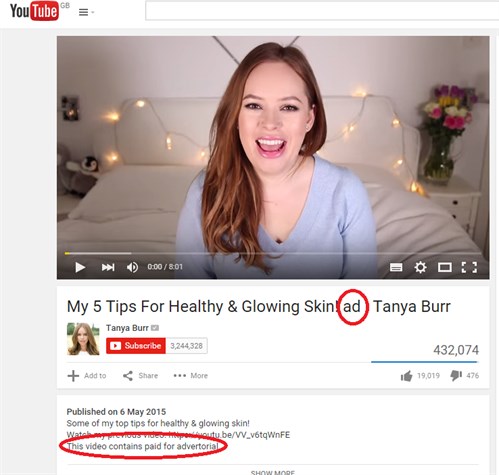Advertising Standards Authority cracks down on vloggers
in News
Did you know that vloggers are actually paid to say something positive about a brand’s product? With vloggers such as Zoella and Tanya Burr reportedly charging £4,000 to just mention a brand?

Up until last year viewers tuning into vlogs (video blogs) were unaware that vloggers were being paid by a brand to talk positively about that product. This is why the Committee Advertising Practise (CAP) has issued its first guidelines to vloggers this summer.
The CAP’s guidance comes after the Advertising Standards Authority (ASA) investigated a number of videos which were not clearly labelled as adverts and so ruled that vloggers need to be clear to viewers when promoting products.
The debate was first sparked in November 2014 when BBC Newsround first raised the issue. A group of influential Vloggers had been signed up by Mondelez, parent company of biscuit brand Oreo. They wanted to get their message out to the millions of people following the vlogs and get them to encourage viewers to participate in a ‘ Lick Race’ challenge.
The BBC made a formal complaint for the videos to be investigated and the ASA found that adverts were not clearly marked and they didn’t indicate there was a commercial relationship between the advertiser and the vloggers.
So what’s happened since?
CAP’s new guidelines states that:
- If a blogger is in a relationship with a brand and is paid to say something positive then is then it becomes an advertisement
- They must disclose this by signposting as ‘ad’, ‘advertorial’, or ‘sponsored content’ in their video description.
- If vloggers are advertising their own products they need to make viewers aware of thisbefore they begin watching and clicking on the content.
However, it is important to mention that the guidelines state that when free items are sent to vloggers without any content control by a brand, there is no need for them to follow the CAP code.
What does this mean to you?
These new guidelines mean that if your brand wants to promote a product, especially to a young audience, and would like to work with a vlogger, you need to make sure the vlogger clearly sign posts their content.
The popularity of vloggers has increased over the years, with YouTube now the biggest platform for teenagers. As a PR agency, we regularly use bloggers and vloggers to communicate our brand stories. So it’s good to see that bloggers/vloggers can still use their editorial discretion.
Let us know your thoughts on the new guidelines.

